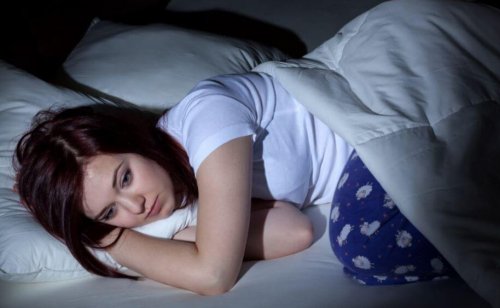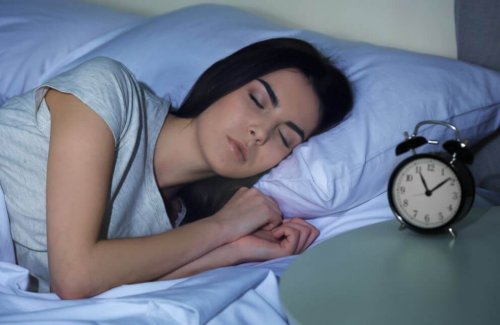How Sleep Affects Your Weight

Is it true that sleep affects your weight? Researchers have looked into this question in recent years. Indeed, several studies seem to indicate that there is a link between the two. Find out more below and learn about how sleep affects your weight.
How sleep affects your weight
There are already several studies that suggest a link between sleep and your weight. As such, these results show the importance of a good night’s sleep. It involves sleeping for the right number of hours. In addition, sleeping more or less than the hours you need can be bad for your overall wellbeing.
Researchers at the UNAM’s Clinic of Sleep Disorders showed that those who sleep less than seven or eight hours a day are more likely to gain weight. They studied 68,000 middle-aged American people to reach their results.

The study results showed that women who sleep seven or eight hours each day are 15 percent less likely to be obese or seriously overweight.
The study also observed women who work rotating shifts, that is, those who sometimes work day shifts while other times working night shifts. They concluded that they have a higher risk of having type 2 diabetes and being overweight.
Experts believe that the rise in obesity around the world is due, among other factors, to a change in sleeping habits. Until not long ago, not sleeping well was synonymous with being irritated, in a bad mood, and unable to focus the next day. However, there’s also a less obvious outcome, which is weight gain.
How is it that sleep affects your weight?
Hormonal changes
When someone sleeps more than eight hours or sleeps less than five hours, a hormonal disturbance occurs. This is one of the main factors in weight gain. The disturbance affects the hormones that regulate hunger and satiety, known as ghrelin and leptin.
Ghrelin is the hormone that tells your body that you’re hungry. Leptin, on the other hand, tells your body not to eat more because it’s full. In other words, it regulates your satiety.
When a person sleeps less or more than the recommended hours, the levels of these hormones are affected. Your body produces ghrelin in excess, leading to a bigger appetite. Also, your leptin production won’t reach the minimum levels your body needs.
Because of the hormonal imbalance, you’ll feel much hungrier and your satiety levels will be lower. As a result, you might gain weight.

Decrease in exercise
The chances of a tired person exercising decrease considerably. This factor also indirectly influences weight gain after a bad night’s sleep.
Many experts have shown that people who don’t sleep enough are more likely to be sedentary and spend more hours watching television.
Body temperature
There also seems to be a link between sleeping less than recommended, and a decrease in body temperature. The main consequence is that your energy expenditure also decreases. As such, it ends up using a much lower percentage of energy from stored fat.
So far, studies also indicate that sleep-related weight gain equally affects all ages and sexes. One difference is that, at certain ages, as is the case with children, you need to sleep more.
The general recommendation is to try to take on healthier habits and follow a balanced lifestyle. Therefore, you’ll need to organize your daily schedule to be able to calmly complete all of your planned activities. Finally, it’s important to try to sleep between seven and eight hours a day to be active and energized throughout the day.
Is it true that sleep affects your weight? Researchers have looked into this question in recent years. Indeed, several studies seem to indicate that there is a link between the two. Find out more below and learn about how sleep affects your weight.
How sleep affects your weight
There are already several studies that suggest a link between sleep and your weight. As such, these results show the importance of a good night’s sleep. It involves sleeping for the right number of hours. In addition, sleeping more or less than the hours you need can be bad for your overall wellbeing.
Researchers at the UNAM’s Clinic of Sleep Disorders showed that those who sleep less than seven or eight hours a day are more likely to gain weight. They studied 68,000 middle-aged American people to reach their results.

The study results showed that women who sleep seven or eight hours each day are 15 percent less likely to be obese or seriously overweight.
The study also observed women who work rotating shifts, that is, those who sometimes work day shifts while other times working night shifts. They concluded that they have a higher risk of having type 2 diabetes and being overweight.
Experts believe that the rise in obesity around the world is due, among other factors, to a change in sleeping habits. Until not long ago, not sleeping well was synonymous with being irritated, in a bad mood, and unable to focus the next day. However, there’s also a less obvious outcome, which is weight gain.
How is it that sleep affects your weight?
Hormonal changes
When someone sleeps more than eight hours or sleeps less than five hours, a hormonal disturbance occurs. This is one of the main factors in weight gain. The disturbance affects the hormones that regulate hunger and satiety, known as ghrelin and leptin.
Ghrelin is the hormone that tells your body that you’re hungry. Leptin, on the other hand, tells your body not to eat more because it’s full. In other words, it regulates your satiety.
When a person sleeps less or more than the recommended hours, the levels of these hormones are affected. Your body produces ghrelin in excess, leading to a bigger appetite. Also, your leptin production won’t reach the minimum levels your body needs.
Because of the hormonal imbalance, you’ll feel much hungrier and your satiety levels will be lower. As a result, you might gain weight.

Decrease in exercise
The chances of a tired person exercising decrease considerably. This factor also indirectly influences weight gain after a bad night’s sleep.
Many experts have shown that people who don’t sleep enough are more likely to be sedentary and spend more hours watching television.
Body temperature
There also seems to be a link between sleeping less than recommended, and a decrease in body temperature. The main consequence is that your energy expenditure also decreases. As such, it ends up using a much lower percentage of energy from stored fat.
So far, studies also indicate that sleep-related weight gain equally affects all ages and sexes. One difference is that, at certain ages, as is the case with children, you need to sleep more.
The general recommendation is to try to take on healthier habits and follow a balanced lifestyle. Therefore, you’ll need to organize your daily schedule to be able to calmly complete all of your planned activities. Finally, it’s important to try to sleep between seven and eight hours a day to be active and energized throughout the day.
This text is provided for informational purposes only and does not replace consultation with a professional. If in doubt, consult your specialist.








